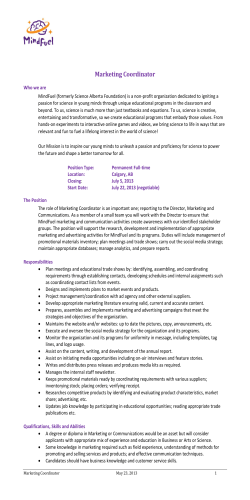
celac jihri - EU
THE EU-CELAC JOINT INITIATIVE ON HEALTH RESEARCH AND INNOVATION * EU- CELAC JIHRI * FACT SHEET, APRIL 2015 WHAT IS THE EU-CELAC JIHRI? The EU-CELAC JIHRI is a joint initiative between European Union (EU) and Latin America and the Caribbean (CELAC) countries to enhance and coordinate the scientific and technological collaboration between Europe and Latin America and the Caribbean in the area of health research and innovation. WHERE DOES THE EU-CELAC JIHRI STAND IN THE CONTEXT OF THE EU-CELAC POLICY DIALOGUE? The European Union and the countries of Latin America and the Caribbean approved a Joint Initiative for Research and Innovation (JIRI)1 in 2010, to develop what has been named as the EU-LAC Knowledge Area. Both regions confirmed the importance of health research and innovation collaboration, creating in 2013 a working group on health within the EU-CELAC Senior Official Meeting (SOM). The working group on health, led by Spain and Brazil, promotes the JIHRI with the technical support of the EU-LAC HEALTH project, funded by the European Commission Seven Framework Programme (FP7). WHAT ARE THE VISION AND MISSION OF THE EU-CELAC JIHRI? The VISION of the EU‐CELAC JOINT INITIATIVE ON HEALTH RESEARCH AND INNOVATION (EU-CELAC JIHRI) is to be the bridge and reference to bi-regional health research and innovation collaboration among EU and CELAC countries, providing support to public policies, such as research and innovation for health, directed to improving health, social wellbeing and equity. The MISSION of the EU-CELAC JIHRI is to efficiently address public needs by implementing sustainable collaborative health research and innovation with bi-regional added value based on a joint agenda endorsed by policy makers, researchers and stakeholders from EU and CELAC. HOW AND WHO IS WORKING TOWARDS THE CREATION OF THE EU-CELAC JIHRI? The EU-LAC HEALTH project is an EC funded project which started on the 1st October 2011 with 5-year duration. Its main goal is to develop a strategic roadmap that will intensify and coordinate the biregional collaboration between the European Union member states and the Latin America and the Caribbean countries in the area of health research and innovation. The EU-LAC health project, with the political support of the SOM working group on health and the funding of the EC, is working towards the creation of the EU-CELAC JIHRI, and has drafted a 1st STRATEGIC ROADMAP, which serves as the guidance document for the creation and launching of the JIHRI. The Roadmap includes a SCIENTIFIC RESEARCH AGENDA, identifying 6 priority areas in health research for collaboration between the two regions: Chronic diseases, Infection, Cancer, Neurological disease and stroke, Prevention of disease and promotion of well being and health and Social Care service research. 1 http://ec.europa.eu/research/iscp/pdf/policy/lac/joint_initiative_for_research_and_innovation_en.pdf#view=fit&pagemode=none 1 The EU-CELAC JIHRI STRATEGIC ROADMAP reflects a general statement of intentions: the VISION and MISSION of the Initiative, the OBJECTIVES and KEY PRINCIPLES. It includes a SCIENTIFIC RESEARCH AGENDA, with SIX priority areas identified for cooperation. It also proposes a GOVERNANCE STRUCTURE suitable for the purpose and that can ensure an effective and long term coordination of health research and innovation funds and activities between both regions. It includes an IMPLEMENTATION TIMELINE (ROADMAP) for the period 2015-2020, indicating actions to be taken and stakeholders to involve in order to implement and consolidate the Initiative. 2 The following chart shows main activities and expected milestones contemplated in the Roadmap: 2015 POLICY GOVER NANCE ACTIVITIES Establishment of an Interim Governing Board and executive support secretariat Terms of reference of Scientific Advisory Board SCIENT. STAKE GUIDA HOLD NCE ERS' INVOL ●●● ● ●●● ●● Terms of reference of Stakeholder's Advisory Board ●●● Scientific Advisory Board operational ●●● ●● ●● ●●● Strategic Research Agenda defined 2016 EU LAC Health Project YEAR FUNCTION Stakeholder's Advisory Board operational ●●● Interim Secretariat operational ●●● EU-CELAC JIHRI launch ●●● Preparation of the Sustainability Plan ●●● EU-CELAC JIHRI dissemination and advocacy ●●● Pilot EU-CELAC JIHRI action launch ●●● ● ●● ●● ● ● ● ●● ●● ●● ●●● ●●● ●● ● ●●● ●● ● ●● ●● ●● ●● ●● ●● ●●● ● ● ●● ● ●● ●● ●● ●● ●● ●● ●● ●● ●● ●● MILESTONES (expected by the end of each period) INTERIM GOVERNING BOARD FUNCTIONAL EU-CELAC JIHRI GOVERNANCE STRUCTURE IMPLEMENTED EU-CELAC JIHRI OPERATIONAL 2017 Mapping update: repository on programmes, projects, capacities and infrastructures Actions for the alignment of the national health R&I programmes Design of plan to increase the research on access to health innovation Preparation of EU-CELAC JIHRI 1st Work Plan Design of a plan to promote the access to EU and CELAC research infrastructures, mobility and capacity building EU-CELAC JIHR Health Research and Policy Forum Definition of a Innovation Facilitating Plan 2018 - 2020 EU-CELAC Joint Initiative on Health Research and Innovation End of EU-LAC Health project Coordination with initiatives in the framework of Horizon 2020 and other existing initiatives Dissemination and advocacy of the EU-CELAC JIHRI nd Preparation of EU-CELAC JIHRI 2 Work Plan Monitoring of EU-CELAC JIHRI ●●● Impact assessment of the initiative ●●● ● ●● Update of the Scientific Research Agenda ●●● ●●● ● ●●● ● ●● Study of the strategic expansion of JIHRI beyond EU-CELAC Renewal and extension of the partnership 3 ●●● ALIGNNED HEALTH R&I FUNDED ACTIVITIES SPECIFIC EUCELAC JIHRI PLANS IMPLEMENTED MONITORING AND IMPACT ASSESSMENT OF THE INITIATIVE WHICH ARE THE IMMEDIATE STEPS? For the period 2015-2016, the concrete steps to be addressed are the following: Validation and approval of the Strategic Roadmap by the members of the SOM working group on health. Creation of the interim Governing Board of the JIHRI Dissemination and policy dialogue to support the JIHRI Refining the roadmap Seeking support for the launching of the JIHRI (Governing Board plus Secretariat). WHICH ARE THE LONG TERM EXPECTATIONS OF THE INITIATIVE? The long term expectations of the EU-CELAC JOINT INITIATIVE ON HEALTH RESEARCH AND INNOVATION are the following: Addressing common challenges, aligning research programmes and avoiding duplications by fostering balanced EU-LAC-partnerships. Maximizing synergies among national partners of both regions putting together expertise scattered across different countries. Expanding the scientific and societal impact of the research, thus reducing health gaps in a globalized world. 4 ANNEX: EU-LAC Health Partners, Members of Advisory Board and Members of the EULAC Health Scientific Working Groups PARTNERS: Instituto de Salud Carlos III – ISCIII. Spain. Coordinator. Red Iberoamericana Ministerial de Aprendizaje e Investigación en Salud – RIMAIS/Ministerio de Salud– MSCR. Costa Rica. Sociedad para el Fomento de la Innovación Tecnológica – INNOVATEC. Spain. Council on Health Research for Development – COHRED. Switzerland. Deutsches Zentrum für Luft- und Raumfahrt e.V. – DLR. Germany. Fundação Oswaldo Cruz – FIOCRUZ. Brazil. Ministerio de Ciencia, Tecnología e Innovación Productiva – MINCYT. Argentina. Agenzia per la Promozione della Ricerca – APRE. Italy. Institut national de la santé et de la recherche médicale – INSERM/Alliance nationale pour les sciences de la vie et de la santé – Aviesan. France. Instituto Nacional de Ciencias Médicas y Nutrición Salvador Zubirán – INNCMNSZ. Mexico MEMBERS OF ADVISORY BOARD: Dr. Stephane Berghmans, (Elsevier) Belgium Prof. Jaime Breilh, (Universidad Andina Simón Bolívar) Ecuador Dr. Alfredo Cesario, (Catholic University and IRCCS Arcispedale Santa Maria Nuova, Reggio Emilia) Italy Dr. Luis Gabriel Cuervo (Pan American Health Organization (PAHO)/World Health Organization) Dr. Maria Ximena Luengo Charath, (Ministerio de Salud and Universidad de Chile) Chile Prof. Sir Salvador Moncada, (The Wolfson Institute for Biomedical Research. University College London) United Kingdom Prof. Dr. Katja Radon, (University Hospital Munich) Germany Dr. Maria del Rocio Saenz Madrigal, (Caja Costarricense de Seguro Social) Costa Rica Prof. Karl Theodore, (University of the West Indies) Trinidad & Tobago Prof. Eero Vuorio, (Biocenter Finland) Finland Consultation and Validation Workshop. Madrid, October 2014 5 SCIENTIFIC WORKING GROUPS HEALTH AND SOCIAL CARE SERVICES RESEARCH Dr. Enrique Bernal-Delgado (EU coordinator), Senior researcher, Institute for Health Sciences, Aragon, Spain. Dr. Karl Theodore (LAC Coordinator), Director, HEU, Centre for Health Economics, University of the West Indies, St. Augustine, Trinidad and Tobago. Dr. Antonio Pietroiusti, Assistant Professor, Department of Biomedicine and Prevention, University of Rome "Tor Vergata", Italy. Dr. Malaquías López Cervantes, Professor, National Autonomous University of Mexico, Mexico. Dr. Henrique Barros, Head of the Department of Clinical Epidemiology, Predictive Medicine and Public Health, University of Porto Medical School, Portugal. Dr. Manuel Espinoza, Professor, Pontificia Universidad Católica; Scientific Advisor, Department of Scientific Affairs, Institute of Public Health, Chile PREVENTION OF DISEASES AND PROMOTION OF WELL-BEING Dr. Antonio Giulio de Belvis (EU coordinator), Assistant Professor, Catholic University “Sacro Cuore”, Italy. Dr. Miguel Rojas Chaves (LAC coordinator), Coordinator, Biotechnology Research Center, Technology Institute (TEC), Costa Rica. Dr. Valentín Fuster, General Director, National Centre for Cardiovascular Research, Spain; Director of the Cardiovascular Institute and Physician-in-Chief, Mount Sinai Medical Centre, New York. Dr. Rainford Wilks, Director, Epidemiology Research Unit, Tropical Medicine Research Institute, University of the West Indies, Jamaica. Dr. Marisa Buglioli, Head of the Department of Preventive and Social Medicine, University of the Republic, Uruguay. INFECTION Dr. Manuel Cuenca Estrella (EU coordinator), Director, National Center for Microbiology, Spain. Dr. José Paulo Gagliardi Leite (LAC coordinator), Senior Researcher, Laboratory of Comparative and Environmental Virology Oswaldo Cruz Institute,Oswaldo Cruz Foundation, Ministry of Health, Brasil. Dr. Stefano Vella, Director, Department of Pharmacology and Therapeutic Research, National Institute of Health, Italy. Dr. Pedro Cahn, Founder and President of Fundacion Huesped, Argentina. Dr. Pablo Bonvehí, Chairman of the Infectious Diseases Unit, Center for Medical Education and Clinical Research “Norberto Quirno”, Argentina. Dr. Fernando Pio de la Hoz Restrepo, General Director, National Institute of Health, Colombia. CHRONIC DISEASES Dr. Carlos Alberto Aguilar Salinas (LAC coordinator), Deputy Head of the Department of Endocrinology and Metabolism, National Institute for Medical Science and Nutrition, Mexico. Dr. Mathias Fasshauer (EU coordinator), Deputy Director, Department of Endocrinology and Nephrology, University of Leipzig, Germany. Dr. Daniel Ferrante, Coordinator of National Cardiovascular Diseases Program, Ministry of Health, Argentina. Dr. Luis A. Castaño, Scientific Director, CIBERDEM (Spanish Diabetes Research network), Spain. Dr. Davide Lauro, Professor of Endocrinology and Diabetology, Department of Systems Medicine, University of Rome "Tor Vergata", Italy. Dr. Mauricio Lima Barreto, Professor of Endocrinology, Federal University of Bahia, Nation Council for Scientific and Technological Development, Brazil. 6 CANCER Dr. Eduardo L. Cazap (LAC coordinator), Founder and first President of the Latin American & Caribbean Society of Medical Oncology (SLACOM), Argentina. Dr. John E. Ellershaw (EU coordinator), Professor of Palliative Medicine and Director of the Marie Curie Palliative Care Institute Liverpool, United Kingdom. Dr. Alejandro Mohar, Head of the Epidemiology Unit, National Cancer Institute, Mexico. Dr. Gemma Gatta, Evaluative Epidemiology, National Cancer Institute, Italy. NEUROLOGICAL DISEASES AND STROKE Dr. Gabrielle Britton (LAC coordinator), Staff Scientist, Centre for Neuroscience and Clinical Research Unit, INDICASAT AIP, Panamá Dr. Rita Raisman (EU coordinator), Research Director, National institute of health and medical research (INSERM), France. Dr. Marcelo Kauffman, Head of the Neurogenetics Clinic and Laboratory at the Hospital JM Ramos Mejia in Buenos Aires, Argentina. Dr. Maria Luisa Sacchetti Researcher, Department of Neurology and Psychiatry, “Sapienza” University of Rome, Italy. Dr. Rodrigo Salinas, Assistant professor of clinical neurology at the Faculty of Medicine, University of Chile. Dr. José Castillo Sánchez, Professor in neurology at the University of Santiago de Compostela, Spain. More information: www.eulachealth.eu 7
© Copyright 2026









